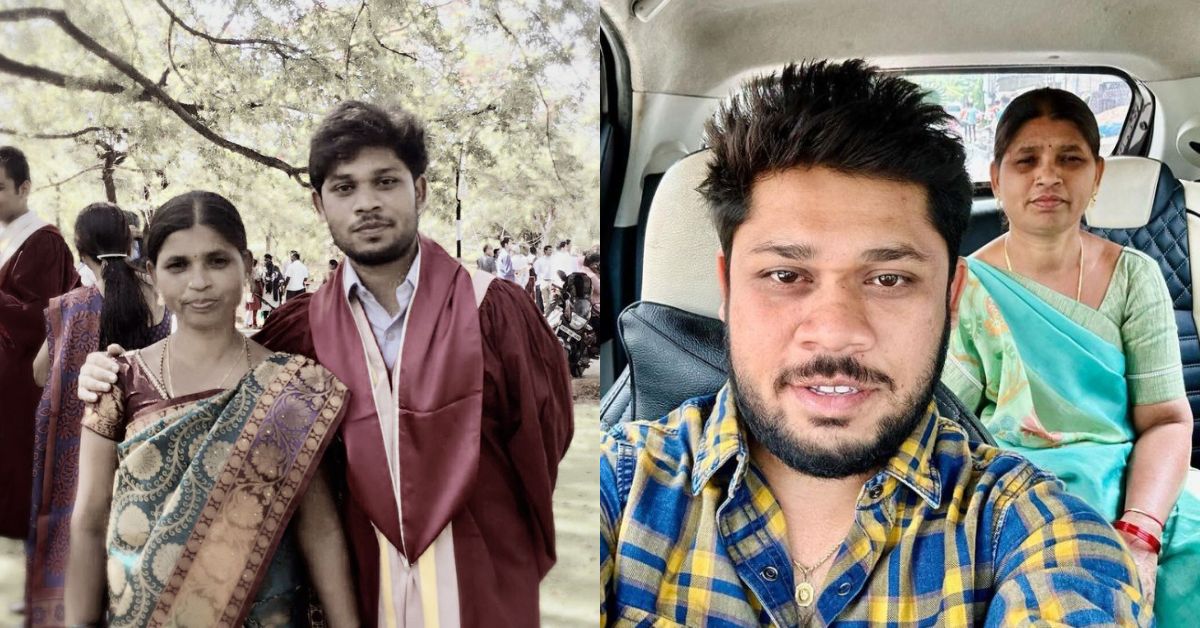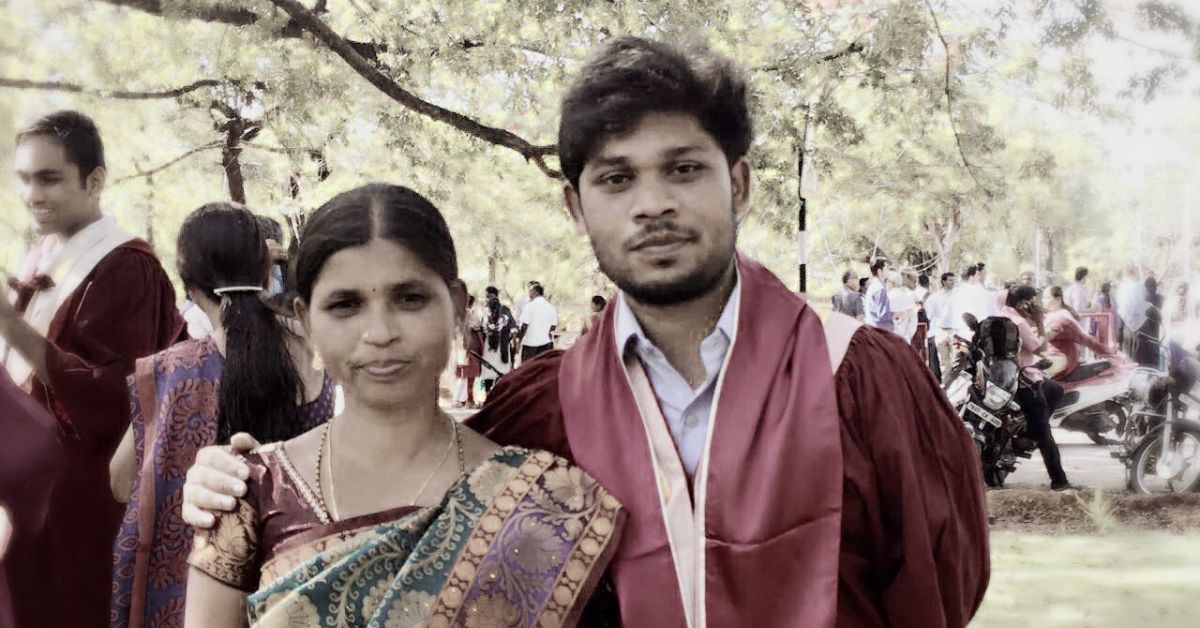It was the usual weekend when the district collectorate of Kumuram Bheem Asifabad in Telangana had reached out to rural residents to understand their plea. Among the crowd, a teenager stepped out with two documents — a letter from the state university and an offer letter from IIT.
It was now on the collectorate to help the student pursue either career. All he needed was financial help of Rs 20,000 to study engineering at IIT Madras. Through crowdfunding and with the help of the collectorate, he got the fee to register at the college. But this also inspired him to become an IAS officer.
“Although I cracked IIT JEE, I had almost lost hope that I would be able to study there because of lack of money. But Dr Ashok Kumar sir [the then collector] helped me a lot. That day, I realised if I was in that position, I could also help people from impoverished backgrounds,” Dongre Revaiah, an IIT Madras graduate, tells The Better India.
Nearly a decade later, today the 29-year-old has become an IAS officer. He cleared UPSC CSE 2022 with an All India Rank of 410, securing 961 marks. We sat down with him to trace his journey to becoming an IAS.

Beating all odds
When Dongre was four years old, his father passed away, leaving his wife and three children behind. To make ends meet, his mother started working as a mid-day meal cook at a monthly salary of Rs 1,500. Almost 14 times this amount was required for registration at IIT.
Born and raised in Tungda village, he completed schooling at a government school. In 2017 after completing an integrated course in chemical engineering from IIT Madras, he also cleared GATE with an AIR 70. This helped him get a job at Oil and Natural Gas Corporation Limited (ONGC), Mumbai.
All this while, the aspiration to become an IAS officer did not diminish. In 2020, he started preparing for UPSC alongside his job. “I gave my first attempt in 2021. I missed the final list by two marks,” he says.
So, Dongre quit his job to focus on the next attempt. This year, he secured AIR 410 and is expected to join the Maharashtra cadre. “My mother did not have any formal education and she never went to school. Despite being a single mother, working as a mid-day meal cook, and with the responsibility of raising three kids, she still wanted me to pursue my dream to become an IAS officer. It is so satisfying to be able to fulfil not only your dream, but also your parent’s dreams for you,” he says.
Tips for aspirants
Dongre shares his mistakes and the strategy that worked out for him while preparing for the UPSC CSE examination.
1. Practice as per the exam pattern: Dongre informs that for the General Studies exam’s answer writing, he would practise one paper in a day. “But in mains, you need to write two papers, and similarly two papers the other day. On the first day, I managed to write two papers but the second day, I started getting pain in my wrist. I had to leave around 4-5 questions because of which I got fewer marks,” he says.
He rectified this mistake in the second attempt. “I started practising as per the examination pattern. For instance, I would practise writing two papers on Saturday and two papers on Sunday. I did not get the hand pain issue in the next examination. It is better to practise two essays at a time,” he adds.
2. Do thorough research before choosing optional: Dongre chose Mathematics as an optional subject in both of his attempts. “I found that the problem with a lot of aspirants, even with my close friends, was that they are not able to manage both General Studies and Maths together. Reason why one should do good research of the subject before choosing optional,” he says.
“If they have an interest in the subject, they can practise it properly. But many people change their optional after two or three attempts. This is just a waste of time. Aspirants who have chosen Maths should practise more and focus on reducing mistakes. In mains, I focused more on value-added parts like data. I dedicated half of my preparation time to optional,” he adds.
3. Focus on short notes: Dongre says that one of the reasons he failed in the first attempt was that he did not prepare short notes initially. “I wanted to rectify this mistake. Short notes help you revise multiple times and remember crucial information. I started preparing short notes for every subject, be it mains or prelims,” he says.
“I write keywords for any topic that will help me remember the topic. Also, we should not make notes very bulky, because you won’t be able to quickly revise it. For any topic, I would prepare short notes of half or one [A4 sheet] page and 20-25 pages for each subject on average,” he adds.
Dongre suggests that aspirants should avoid making short notes while reading any subject for the first time. “One should prepare short notes only after one or two readings of the topic. This will help us understand what information is important and what isn’t. You could check [mobile app] Telegram to get insight on how toppers prepare shot notes,” he says.
4. What to study: Dongre kept sources very minimal, and revision maximum. He relied on only one standard book for every subject. For Indian Polity, he studied the publication by M Laxmikanth; for Modern India, Spectrum; for Ancient and Medieval, Tamil Nadu history textbook; for Geography, NCERT book of Class 11; for Economic, Mrunal handouts, for Science & Technology, handouts of current affair; and for Art & Culture, Nitin Singhania.
5. Focus more on revision: Instead of increasing sources, Dongre says to focus on regular revision more, as it helps ensure aspirants remember crucial information. “My focus was on revision rather than reading more new content. This helped me crack prelims in both attempts easily,” he says.
6. Do not prepare for the interview only after the mains: Dongre says that interview preparation should not start only after the mains examination. “It should be an integral part of our preparation from the beginning. Read the newspapers regularly and for every topic that you read, you must try to form an opinion on it,” he says.
“For example, for any development happening in the country, you must know what the project is, why it is important, what would be its implications, and how we can make the project better. Having one or two friends to discuss such topics helps to build conversational skills,” he adds.
Dongre informs that initially, he did not develop a habit of reading newspapers. “But it is a very important activity. Without reading newspapers, we can sail through prelims and mains but for the interview, we need to share our opinions, and that comes after getting information through newspapers,” says Dongre, who secured 146 marks out of 275 in the interview.
Other than that, aspirants should do thorough research on their college, academics, hometown, district, and culture. “Interviewers generally ask most of the questions about your background, research helps create a good impression,” he adds.
Edited by Divya Sethu
If you found our stories insightful, informative, or even just enjoyable, we invite you to consider making a voluntary payment to support the work we do at The Better India. Your contribution helps us continue producing quality content that educates, inspires, and drives positive change.
Choose one of the payment options below for your contribution-
By paying for the stories you value, you directly contribute to sustaining our efforts focused on making a difference in the world. Together, let's ensure that impactful stories continue to be told and shared, enriching lives and communities alike.
Thank you for your support. Here are some frequently asked questions you might find helpful to know why you are contributing?


Check what other members are talking about -
Dear Sir,
I have one filed and published patent which is awaiting for the grant.
The key features of the patent are as follows.
1.24X7 water supply across the country and globe.
2. It do not require the conventional power supply as it works on wind energy.
3. Multiple water sources can be concted.
4. Even water scares borewells can be effectively used.
5. Complete farming land across the country and globe can be irrigated.
6. By the way we can supply 24 X 7 water supply across the country and even in any corner of the world.
7.initial investment for one structure is approximately Rs 100000/-
8. Zero maintenance costs for life time.
9. Hybrid system can also be used.
Please contact
Sidramappa Dharane
Patentee
9284385485
9284093972
9890283390
Email
dr.sidramappa@gmail.com
dr.appari@gmail.com
Note: Please respond
Even it works in heavy drought and moreover it uses all the existing resources thereby the every citizen’s and national economy will enhance.
Thanks
Dear Sir,
I have one filed and published patent which is awaiting for the grant.
The key features of the patent are as follows.
1.24X7 water supply across the country and globe.
2. It do not require the conventional power supply as it works on wind energy.
3. Multiple water sources can be concted.
4. Even water scares borewells can be effectively used.
5. Complete farming land across the country and globe can be irrigated.
6. By the way we can supply 24 X 7 water supply across the country and even in any corner of the world.
7.initial investment for one structure is approximately Rs 100000/-
8. Zero maintenance costs for life time.
9. Hybrid system can also be used.
Please contact
Sidramappa Dharane
Patentee
9284385485
9284093972
9890283390
Email
dr.sidramappa@gmail.com
dr.appari@gmail.com
Note: Please respond
Even it works in heavy drought and moreover it uses all the existing resources thereby the every citizen’s and national economy will enhance.
Thanks
Umbrella type mashroom